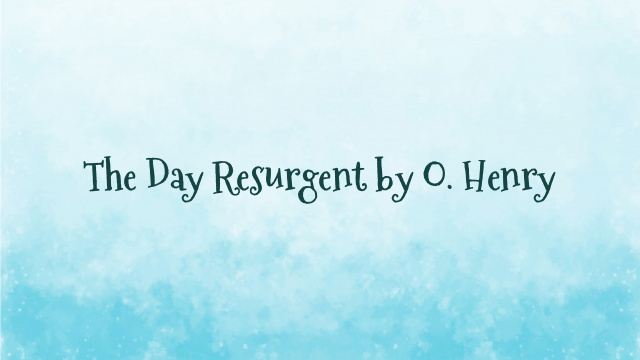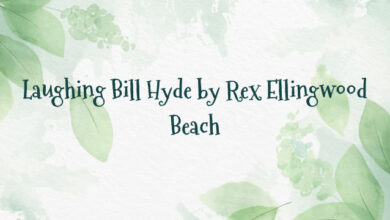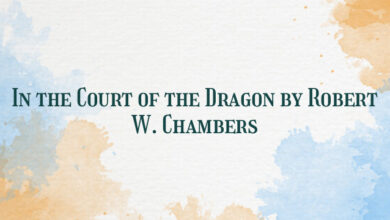
The Day Resurgent by O. Henry
I can see the artist bite the end of his pencil and frown when it comes to drawing his Easter picture; for his legitimate pictorial conceptions of figures pertinent to the festival are but four in number.
First comes Easter, pagan goddess of spring. Here his fancy may have free play. A beautiful maiden with decorative hair and the proper number of toes will fill the bill. Miss Clarice St. Vavasour, the well-known model, will pose for it in the “Lethergogallagher,” or whatever it was that Trilby called it.
Second–the melancholy lady with upturned eyes in a framework of lilies. This is magazine-covery, but reliable.
Third–Miss Manhattan in the Fifth Avenue Easter Sunday parade.
Fourth–Maggie Murphy with a new red feather in her old straw hat, happy and self-conscious, in the Grand Street turnout.
Of course, the rabbits do not count. Nor the Easter eggs, since the higher criticism has hard-boiled them.
The limited field of its pictorial possibilities proves that Easter, of all our festival days, is the most vague and shifting in our conception. It belongs to all religions, although the pagans invented it. Going back still further to the first spring, we can see Eve choosing with pride a new green leaf from the tree ficus carica.
Now, the object of this critical and learned preamble is to set forth the theorem that Easter is neither a date, a season, a festival, a holiday nor an occasion. What it is you shall find out if you follow in the footsteps of Danny McCree.
Easter Sunday dawned as it should, bright and early, in its place on the calendar between Saturday and Monday. At 5.24 the sun rose, and at 10.30 Danny followed its example. He went into the kitchen and washed his face at the sink. His mother was frying bacon. She looked at his hard, smooth, knowing countenance as he juggled with the round cake of soap, and thought of his father when she first saw him stopping a hot grounder between second and third twenty-two years before on a vacant lot in Harlem, where the La Paloma apartment house now stands. In the front room of the flat Danny’s father sat by an open window smoking his pipe, with his dishevelled gray hair tossed about by the breeze. He still clung to his pipe, although his sight had been taken from him two years before by a precocious blast of giant powder that went off without permission. Very few blind men care for smoking, for the reason that they cannot see the smoke. Now, could you enjoy having the news read to you from an evening newspaper unless you could see the colors of the headlines?
“‘Tis Easter Day,” said Mrs. McCree.
“Scramble mine,” said Danny.
After breakfast he dressed himself in the Sabbath morning costume of the Canal Street importing house dray chauffeur–frock coat, striped trousers, patent leathers, gilded trace chain across front of vest, and wing collar, rolled-brim derby and butterfly bow from Schonstein’s (between Fourteenth Street and Tony’s fruit stand) Saturday night sale.
“You’ll be goin’ out this day, of course, Danny,” said old man McCree, a little wistfully. “‘Tis a kind of holiday, they say. Well, it’s fine spring weather. I can feel it in the air.”
“Why should I not be going out?” demanded Danny in his grumpiest chest tones. “Should I stay in? Am I as good as a horse? One day of rest my team has a week. Who earns the money for the rent and the breakfast you’ve just eat, I’d like to know? Answer me that!”
“All right, lad,” said the old man. “I’m not complainin’. While me two eyes was good there was nothin’ better to my mind than a Sunday out. There’s a smell of turf and burnin’ brush comin’ in the windy. I have me tobaccy. A good fine day and rist to ye, lad. Times I wish your mother had larned to read, so I might hear the rest about the hippopotamus–but let that be.”
“Now, what is this foolishness he talks of hippopotamuses?” asked Danny of his mother, as he passed through the kitchen. “Have you been taking him to the Zoo? And for what?”
“I have not,” said Mrs. McCree. “He sets by the windy all day. ‘Tis little recreation a blind man among the poor gets at all. I’m thinkin’ they wander in their minds at times. One day he talks of grease without stoppin’ for the most of an hour. I looks to see if there’s lard burnin’ in the fryin’ pan. There is not. He says I do not understand. ‘Tis weary days, Sundays, and holidays and all, for a blind man, Danny. There was no better nor stronger than him when he had his two eyes. ‘Tis a fine day, son. Injoy yeself ag’inst the morning. There will be cold supper at six.”
“Have you heard any talk of a hippopotamus?” asked Danny of Mike, the janitor, as he went out the door downstairs.
“I have not,” said Mike, pulling his shirtsleeves higher. “But ’tis the only subject in the animal, natural and illegal lists of outrages that I’ve not been complained to about these two days. See the landlord. Or else move out if ye like. Have ye hippopotamuses in the lease? No, then?”
“It was the old man who spoke of it,” said Danny. “Likely there’s nothing in it.”
Danny walked up the street to the Avenue and then struck northward into the heart of the district where Easter–modern Easter, in new, bright raiment–leads the pascal march. Out of towering brown churches came the blithe music of anthems from the choirs. The broad sidewalks were moving parterres of living flowers–so it seemed when your eye looked upon the Easter girl.
Gentlemen, frock-coated, silk-hatted, gardeniaed, sustained the background of the tradition. Children carried lilies in their hands. The windows of the brownstone mansions were packed with the most opulent creations of Flora, the sister of the Lady of the Lilies.
Around a corner, white-gloved, pink-gilled and tightly buttoned, walked Corrigan, the cop, shield to the curb. Danny knew him.
“Why, Corrigan,” he asked, “is Easter? I know it comes the first time you’re full after the moon rises on the seventeenth of March–but why? Is it a proper and religious ceremony, or does the Governor appoint it out of politics?”
“‘Tis an annual celebration,” said Corrigan, with the judicial air of the Third Deputy Police Commissioner, “peculiar to New York. It extends up to Harlem. Sometimes they has the reserves out at One Hundred and Twenty-fifth Street. In my opinion ’tis not political.”
“Thanks,” said Danny. “And say–did you ever hear a man complain of hippopotamuses? When not specially in drink, I mean.”
“Nothing larger than sea turtles,” said Corrigan, reflecting, “and there was wood alcohol in that.”
Danny wandered. The double, heavy incumbency of enjoying simultaneously a Sunday and a festival day was his.
The sorrows of the hand-toiler fit him easily. They are worn so often that they hang with the picturesque lines of the best tailor-made garments. That is why well-fed artists of pencil and pen find in the griefs of the common people their most striking models. But when the Philistine would disport himself, the grimness of Melpomene, herself, attends upon his capers. Therefore, Danny set his jaw hard at Easter, and took his pleasure sadly.
The family entrance of Dugan’s café was feasible; so Danny yielded to the vernal season as far as a glass of bock. Seated in a dark, linoleumed, humid back room, his heart and mind still groped after the mysterious meaning of the springtime jubilee.
“Say, Tim,” he said to the waiter, “why do they have Easter?”
“Skiddoo!” said Tim, closing a sophisticated eye. “Is that a new one? All right. Tony Pastor’s for you last night, I guess. I give it up. What’s the answer–two apples or a yard and a half?”
From Dugan’s Danny turned back eastward. The April sun seemed to stir in him a vague feeling that he could not construe. He made a wrong diagnosis and decided that it was Katy Conlon.
A block from her house on Avenue A he met her going to church. They pumped hands on the corner.
“Gee! but you look dumpish and dressed up,” said Katy. “What’s wrong? Come away with me to church and be cheerful.”
“What’s doing at church?” asked Danny.
“Why, it’s Easter Sunday. Silly! I waited till after eleven expectin’ you might come around to go.”
“What does this Easter stand for, Katy,” asked Danny gloomily. “Nobody seems to know.”
“Nobody as blind as you,” said Katy with spirit. “You haven’t even looked at my new hat. And skirt. Why, it’s when all the girls put on new spring clothes. Silly! Are you coming to church with me?”
“I will,” said Danny. “If this Easter is pulled off there, they ought to be able to give some excuse for it. Not that the hat ain’t a beauty. The green roses are great.”
At church the preacher did some expounding with no pounding. He spoke rapidly, for he was in a hurry to get home to his early Sabbath dinner; but he knew his business. There was one word that controlled his theme–resurrection. Not a new creation; but a new life arising out of the old. The congregation had heard it often before. But there was a wonderful hat, a combination of sweet peas and lavender, in the sixth pew from the pulpit. It attracted much attention.
After church Danny lingered on a corner while Katy waited, with pique in her sky-blue eyes.
“Are you coming along to the house?” she asked. “But don’t mind me. I’ll get there all right. You seem to be studyin’ a lot about something. All right. Will I see you at any time specially, Mr. McCree?”
“I’ll be around Wednesday night as usual,” said Danny, turning and crossing the street.
Katy walked away with the green roses dangling indignantly. Danny stopped two blocks away. He stood still with his hands in his pockets, at the curb on the corner. His face was that of a graven image. Deep in his soul something stirred so small, so fine, so keen and leavening that his hard fibres did not recognize it. It was something more tender than the April day, more subtle than the call of the senses, purer and deeper-rooted than the love of woman–for had he not turned away from green roses and eyes that had kept him chained for a year? And Danny did not know what it was. The preacher, who was in a hurry to go to his dinner, had told him, but Danny had had no libretto with which to follow the drowsy intonation. But the preacher spoke the truth.
Suddenly Danny slapped his leg and gave forth a hoarse yell of delight.
“Hippopotamus!” he shouted to an elevated road pillar. “Well, how is that for a bum guess? Why, blast my skylights! I know what he was driving at now.
“Hippopotamus! Wouldn’t that send you to the Bronx! It’s been a year since he heard it; and he didn’t miss it so very far. We quit at 469 B. C., and this comes next. Well, a wooden man wouldn’t have guessed what he was trying to get out of him.”
Danny caught a crosstown car and went up to the rear flat that his labor supported.
Old man McCree was still sitting by the window. His extinct pipe lay on the sill.
“Will that be you, lad?” he asked.
Danny flared into the rage of a strong man who is surprised at the outset of committing a good deed.
“Who pays the rent and buys the food that is eaten in this house?” he snapped, viciously. “Have I no right to come in?”
“Ye’re a faithful lad,” said old man McCree, with a sigh. “Is it evening yet?”
Danny reached up on a shelf and took down a thick book labeled in gilt letters, “The History of Greece.” Dust was on it half an inch thick. He laid it on the table and found a place in it marked by a strip of paper. And then he gave a short roar at the top of his voice, and said:
“Was it the hippopotamus you wanted to be read to about then?”
“Did I hear ye open the book?” said old man McCree. “Many and weary be the months since my lad has read it to me. I dinno; but I took a great likings to them Greeks. Ye left off at a place. ‘Tis a fine day outside, lad. Be out and take rest from your work. I have gotten used to me chair by the windy and me pipe.”
“Pel-Peloponnesus was the place where we left off, and not hippopotamus,” said Danny. “The war began there. It kept something doing for thirty years. The headlines says that a guy named Philip of Macedon, in 338 B. C., got to be boss of Greece by getting the decision at the battle of Cher-Cheronoea. I’ll read it.”
With his hand to his ear, rapt in the Peloponnesian War, old man McCree sat for an hour, listening.
Then he got up and felt his way to the door of the kitchen. Mrs. McCree was slicing cold meat. She looked up. Tears were running from old man McCree’s eyes.
“Do you hear our lad readin’ to me?” he said. “There is none finer in the land. My two eyes have come back to me again.”
After supper he said to Danny: “‘Tis a happy day, this Easter. And now ye will be off to see Katy in the evening. Well enough.”
“Who pays the rent and buys the food that is eaten in this house?” said Danny, angrily. “Have I no right to stay in it? After supper there is yet to come the reading of the battle of Corinth, 146 B. C., when the kingdom, as they say, became an in-integral portion of the Roman Empire. Am I nothing in this house?”




